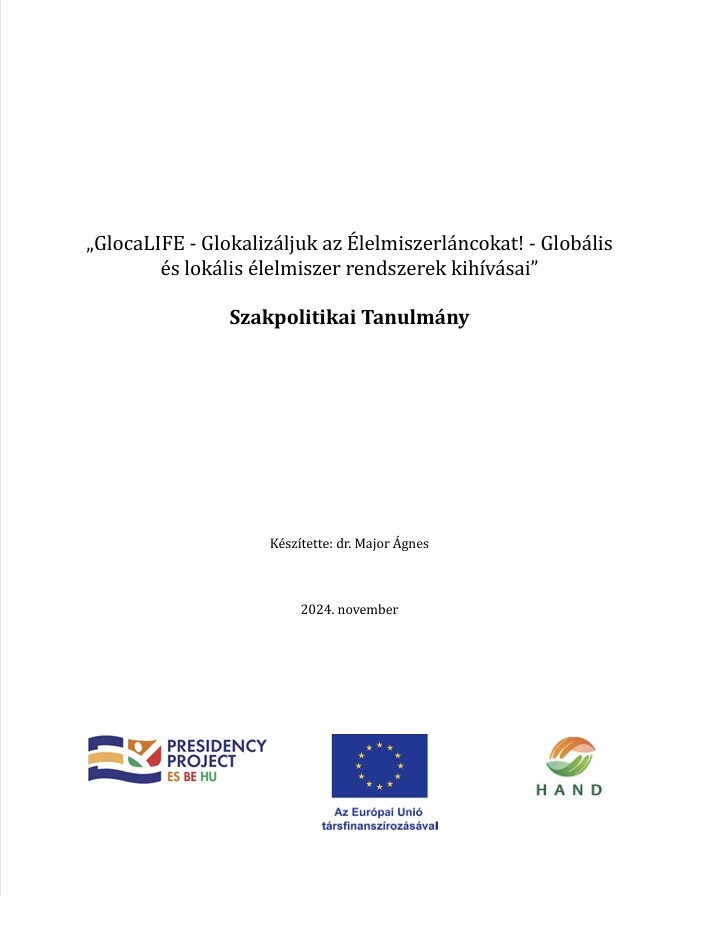New Study and Recommendations on Regulations Related to Short Supply Chains in Europe and Hungary

Bronwyn Carter prepares the paperwork for an order from her tiny farm, credit: Martin Egbert, source: https://reasonstobecheerful.world/tiny-farms-berlin-young-farmers/
Current global food supply systems face numerous serious issues that manifest not only in environmental degradation but also in the exacerbation of social inequalities. Long supply chains, increasingly reliant on the global market, not only increase the ecological footprint but also render local communities vulnerable. Foods often travel thousands of kilometers before reaching consumers, resulting in significant carbon dioxide emissions. Additionally, industrial agriculture and monoculture cultivation contribute to a noticeable decline in biodiversity and a deterioration in soil quality.
The COVID-19 pandemic highlighted how short supply chains can provide solutions to counteract the weaknesses of global food supply systems, allowing food security to be maintained even when border closures hinder international trade. These short supply chains enhance food security and should be regarded as equivalent to the concept of food sovereignty, especially in times of crisis.
The regulation of short supply chains in Europe and locally is influenced by several pieces of legislation; however, practical implementation is generally cumbersome, requiring modifications at various levels.
CEEweb for Biodiversity and the Association of the National Interest Representation of Small-Scale Product Producers and Service Providers recently launched a new study regarding regulations affecting short supply chains.

The study, prepared within the framework of the sustainable food systems project[1], specifically addresses short supply chains and small-scale farmers. The business operations of small producers can be challenging, as they face daily administrative burdens and complicated legislation designed primarily for larger enterprises, industrial-scale producers, and traders. In many cases, small producers operate as one-person businesses, juggling multiple tasks beyond production, such as complying with various laws, managing their complex tax obligations, and handling marketing and communication. The study thus identifies their challenges and offers suggestions to facilitate their operations.
Global efforts to mitigate climate change increasingly recognize the importance of action at the local level, particularly the role of local food systems. The European Union's Farm to Fork strategy prioritizes the development of shorter supply chains, which not only help reduce emissions but also make food supply more sustainable and traceable.
Developing policies aimed at sustainable food consumption and reducing food waste is a critical task in the sustainability transition of agro-food industry systems.
The variety of short food supply chains has expanded significantly across Europe in recent years, presenting one of the biggest opportunities for small producers and family farms to access the market. The study points out that the definition of a short food supply chain is unclear both at the European Union and Member State levels. This lack of clarity hinders the proper exploitation of the diversity and innovation opportunities inherent in value chains. Thus, we propose defining it at the European Union level using the proposed definition from the Horizon 2020 SmartChain project[2].
In 2006, the European Union introduced a Food Hygiene Package[3], a regulatory framework aimed at harmonizing food safety standards across the EU, encompassing all aspects of food production, processing, and distribution. Given that typical participants in short supply chains are small producers and small farms, we recommend, while maintaining food safety goals, that Member States enact flexible rules for small quantities, as permitted by European regulations. Additionally, we propose establishing a European Union working group to prepare guidelines for national authorities on implementing flexible rules and supporting harmonized and unified control methods.
Regarding simplified hygiene rules, the study addresses the need to adapt mobile slaughterhouses to national legislation based on existing European Union legislation.
The study examines Hungarian simplified hygiene regulations applied to small producers, proposing the issuance of a guide that clarifies the application of the concept of small producer quantity concerning two types of producer categories (small producer and small factory), as well as regulating the status of herbs with medicinal properties as food.
Concerning the European Union regulations on green and social public procurement[4], we formulate proposals regarding short food supply chains, emphasizing the preparation of a collection of EU good practices while analyzing the Hungarian context.
The study highlights a successful example from France of farmers' shops[5] that promote collaboration among small producers. This form of cooperation allows farmers to engage in more informal collective action while operating under a pass-through taxation model, where profits (or losses) are passed through to individual members and taxed at their level. We also emphasize the importance of the direct trader status of small farmers through the Polish example, detailing its specifics. In Poland, small farmers can sell their products directly without needing to comply with retail trade requirements.
Our study consolidates the demands of social farms in Hungary that have been formulated over many years. The most significant proposal is to develop legal definitions and supportive policies for social farms.
Finally, the study considers the challenges posed by the Extended Producer Responsibility (EPR) and Deposit Return System (DRS) regulations that were introduced in Hungary last year from the perspective of small producers. Our primary recommendation is that legislation should exempt small producers from EPR registration, data provision, and fee payment obligations.
[1] GlocaLIFE - Let's glocalize food chains! Challenges of the global and local food systems
[4]https://op.europa.eu/en/publication-detail/-/publication/f8e9fe10-ff7d-11e9-8c1f-01aa75ed71a1/language-en
[5] http://www.lexfori.net/concepts_of_french_law_relating_.html
This project is co-funded by the European Union within the framework of the “Towards an open, fair and sustainable Europe in the world - Fourth Trio EU Presidency Project”. Its contents are the sole responsibility of CEEweb for Biodiversity and do not necessarily reflect the views of the European Union.

